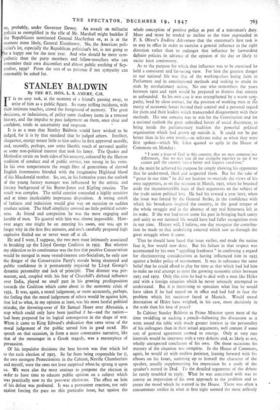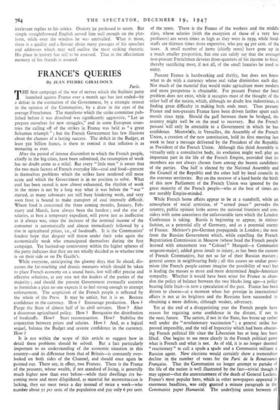STANLEY BALDWIN
By THE RT. HON. L. S. AMERY, C.H.
IT is no easy task, at the moment of a friend's passing away, to write of him as a public figure. So many trifling incidents, with their intimate touches, crowd the foreground of memory. The great decisions, or indecisions, of policy seem shadowy items in a remoter history, and the impulse to pass judgement on them, once clear and confident, tends to uncertainty and suspense.
It is as a man that Stanley Baldwin would have wished to be judged, for it is by that standard that he judged others. Intellect, eloquence, energy meant little to him unless he first approved morally, and, secondly, perhaps, saw some likeable touch of personal quality or some non-political interest that took his fancy. The Quaker and Methodist strain on both sides of his ancestry, coloured by the Harrow tradition of conduct and of public service, ran strong in his veins. In his own temperament the rough fibre of generations of shrewd English ironmasters blended with the imaginative Highland blood of his Macdonald mother. So, too, in his formative years the outlook of the young factory manager was influenced by the artistic and literary background of his Burne-Jones and Kipling cousins. The result was complex. The stolid exterior concealed a highly sensitive and at times incalculably impetuous disposition. A strong streak of laziness and indecision would give way on occasion to sudden resolute action. The bluff simplicity covered no little political astute- ness. As friend and companion he was the most engaging and lovable of men. To quarrel with him was almost impossible. How- ever angry one might be on entering his room, one was apt to forget why in the first five minutes, and one's carefully prepared high explosive fizzled out or never went off at all.
He and I were, I suppose, the two men most intimately associated in breaking up the Lloyd George Coalition in 1922. But whereas my objection to its continuance was the fear that positive Conservatism would be merged in mere vested-interest anti-Socialism, he only saw the danger of the Conservative Party's morale being shattered and public confidence in it permanently impaired by Lloyd George's dynamic personality and lack of principle. That distrust was per- manent, and, coupled with his fear of Churchill's diehard influence over India, played no small part in his growing predisposition towards the Coalition which came about in the economic crisis of 193r— It was, again, a moral judgement, or more accurately, perhaps, the feeling that the moral judgement of others would be against him, that led to what, in my opinion at least, was his most fateful political mistake, the throwing-over of Sir Samuel Hoare over Abyssinia, a step which could only have been justified if he—and the nation— had been .prepared for its logical consequence in the shape of war. When it came to King Edward's abdication that same sense of the moral judgement of the public served him in good stead. His speech on that occasion, in form a mere consecutive narrative, like that of the messenger in a Greek tragedy, was a masterpiece of persuasion.
Of his impulsive decisions the best known was that which led to the rush election of 1923. So far from being responsible for it, the two strongest Protectionists in the Cabinet, Neville Chamberlain and myself, were the ones not least surprised when he sprang it upon us. We were also the most anxious to postpone the election in order to have time to educate public opinion on a subject which was practically new to the post-war electorate. The effect on him of his defeat was profound. It was a permanent reaction, not only against forcing the pace on this particular issue, but against the
whole conception of positive policy as part of a statesman's duty. More and more he tended to incline to the view expounded in F. S. Oliver's Endless Adventure, that the statesman's first task is to stay in office in order to exercise a general influence in the right direction rather than to endanger that influence by forwarding kfinite policies in advance of the opinion of the day or likely to excite keen controversy.
As to the purpose for which that influence was to be exercised he held a consistent and far-seeing view. For him the greatest danger to our national life was that of the working-class losing faith in Parliament and in constitutional methods and seeking to attain its ends by revolutionary action. No one who remembers the years between Iwo and 1926 would be prepared to dismiss that anxiety as unfounded. In his own case it was strengthened by a warm sym- pathy, bred by close contact, for the position of working men at the mercy of economic forces beyond their control and a personal regard for them and their leaders which transcended disagreement with their methods. His one concern was to win for the Constitution and for a national outlook the great unbridled forces of social discontent, to bring inside the parliamentary tradition the powerful political organisation which had grown up outside it. It could not be put better than in his own words,—as relevant today as-when they were first spoken—which Mr. Eden quoted so aptly in the House of Commons on Monday :
"I want a truce of God in this country, that we may compose our diflerences, that we may join all our strengths together to see if we cannot pull the country into a better and happier condition."
In the main he achieved his purpose by simply showing his opponents that he understood, liked and respected them. But for the sake of "peace in our time" he did not hesitate to override the views of his own supporters, as on the occasion in March, 1925, when he brushed aside the incontrovertible logic of their arguments on the subject of the trade union political levy. He had his reward a year later, when the issue was forced by the General Strike, in the confidence with which his broadcasts inspired the country, in the good temper of the whole struggle and in the absence of any real bitterness left in its wake. If the war had never come his part in bringing back sanity and unity to our national life would have had fuller recognition even in our time. History will, I believe, one day recognise the contribu- tion he made to that underlying concord which saw us through the great struggle when it came.
That he should have faced that issue earlier, and made the nation face it, few would now deny. But his failure in that respect was accentuated by his own " appalling frankness " in confessing a regard for electioneering considerations as having influenced him in 1935 against a bolder policy of rearmament. It was in substance The same belief that he could afford to play for time as that which had led him to make no real attempt to meet the growing economic crisis between 1925 and 1929. Only this time he had to deal with a man like Hitler and with a foreign situation which he never seriously attempted to understand. But it is interesting. to speculate what line he would have taken if he had stayed on in office and had had to face the problem which his successor faced at Munich. Would moral detestation of Hitler have weighed, in his case, more decisively in the scale than his love of peace?
In Cabinet Stanley Baldwin as Prime Minister spent most of the time twiddling or sucking a pencil—following the discussion as it went round the table with much greater interest in the personality of his colleagues than in their actual arguments, well content if some sort of general agreement seemed to emerge. Only at very rare intervals would he intervene with a very definite and, as likely as not, wholly unexpected conclusion of his own. On those occasions his mastery of the situation was complete. In the House of Commons, again, he would sit with endless patience, leaning forward with his elbows on his knees, summing up to himself the character of the speaker, usually supplementing his impression by a study of the speaker's record in Dod. To the detailed arguments of the debate he rarely troubled to reply. What he was concerned with was to convey an impression of his own approach to the problem and to create the mood which he wanted in the House. There was often a consummate artifice in what at first sight seemed the most artlessly irrelevant replies to his critics. Oratory he professed to scorn. But simple straightforward English served him well enough on the plat- form, while over the wireless he was unrivalled. What is more, there is a quality and a flavour about many passages of his speeches and addresses which may well outlive the most striking rhetoric. His place in history has still to be assessed. That in the affectionate memory of his friends is assured.



































 Previous page
Previous page